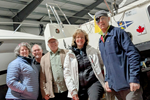Bold Laser Automation presents certified calibration gauge line
Noncontact calibration thickness gauges are engineered to ensure composites manufacturers can maintain tight control over product thickness and material uniformity.
Source | Bold Laser Automation Inc.
(Bedford, N.H., U.S.), a developer of laser processing and metrology systems, has launched a line of certified calibration thickness gauges engineered for calibration of high-accuracy confocal differential measurement systems. Standard and application-specific designs ensure NIST-traceable thickness measurements in film, foil, thin glass, technical fabrics and composites. Designed specifically for integration with the Keyence dual confocal laser displacement sensor configurations, the calibration gauges enable precise, noncontact thickness measurement across a range of inline inspection and quality assurance environments.
In what ways is this technology useful for composites manufacturers? “It simply comes down to quality,” says Todd E. Lizotte, Bold Laser president and CEO. “For instance, in any market — but especially in the composite materials industry with applications involving webs and carbon fiber assemblies —precision in material thickness is critical to ensuring structural performance, product consistency and manufacturing efficiency.
“A certified thickness gauge is vital in qualifying and calibrating noncontact thickness sensors used throughout the production process,” he continues. “Without a traceable standard it is impossible to verify the accuracy or drift of inline thickness sensors. This can lead to undetected material variations that compromise laminate strength, resin flow or dimensional tolerances. In high-value composites, even small deviations in thickness can lead to costly scrap or field failures.”
Developed for integration into discrete filtration and roll-to-roll (R2R) manufacturing environments, the calibration gauges support fast, repeatable calibration routines across a variety of product widths and materials. Each gauge is manufactured to stringent tolerances, with foil and block thicknesses from 0.010 mm to 2.000+ mm using a variety of precision-certified materials that include molybdenum, stainless steel and titanium. The gauges are available in both standard configurations for common film and foil thicknesses, as well as custom options for specialized production requirements.
Key features of the calibration gauge product line include:
- Compatible mounting designs for inline sensor integration across inspection platforms
- Industrial-grade surface durability to withstand high-repetition use
- Custom engraving and calibration targets for automated alignment and validation.
Bold’s technologies support industries that demand precise layer thickness, structural uniformity and repeatable quality metrics in high-speed environments.
Related Content
-
Active core molding: A new way to make composite parts
Koridion expandable material is combined with induction-heated molds to make high-quality, complex-shaped parts in minutes with 40% less material and 90% less energy, unlocking new possibilities in design and production.
-
Troubleshooting thermoplastic composite stamp forming
Understand the basic science of TPC stamp forming, a manufacturing process steadily gaining momentum in aerospace and mobility applications thanks to its rapid forming, short cycle times and automated methods.
-
Bladder-assisted compression molding derivative produces complex, autoclave-quality automotive parts
HP Composites’ AirPower technology enables high-rate CFRP roof production with 50% energy savings for the Maserati MC20.






